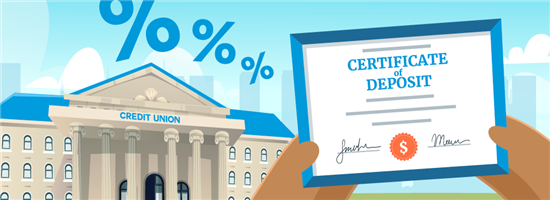Best Credit Union CD Rates
Ad Disclosure: This article contains references to products from our partners. We may receive compensation if you apply or shop through links in our content. This compensation may impact how and where products appear on this site. You help support CreditDonkey by using our links.
Tired of low CD rates? Check out credit union CDs. See who offers the highest CD rates today.
 |
If you're looking for the best CD rates, you might have better luck with credit unions.
Credit unions often offer similar products and services as banks. But, since they're run by and for members, they can give users competitive rates.
Discover all about credit unions including the best CD rates available today, how to choose the best one, and how to open an account.
Here are some credit unions with the best CD rates:
- Liberty Federal Credit Union:
6-Month CD - 4.50% APY - Pelican State Credit Union:
12-Month CD - 4.49% APY - Royal Credit Union:
12-Month CD - 4.40% APY - State Employees' Credit Union (NC):
18-Month CD - 4.40% APY - FORUM Credit Union:
18-Month CD - 4.40% APY - Georgia's Own Credit Union:
6-Month CD - 4.39% APY - Genisys Credit Union:
7-Month CD - 4.37% APY - RiverWorks Credit Union:
6-Month CD - 4.35% APY - America First Credit Union:
6-Month CD - 4.35% APY - Cyprus Credit Union:
6-Month CD - 4.35% APY
Credit Union CD Pros and Cons
Pros
- Competitive rates
- Possible multiple CD term options
- Membership perks and discounts
- Federally insured
Cons
- Must be a member to open
- Early withdrawal penalties
- Usually small branch network
Who Is It Best For?
Credit union CDs are ideal for folks living or working in the communities where the credit union operates. That means you're likely to qualify as a member and access high CD rates with no fuss.
However, most credit unions have a limited branch network. Also, some credit unions might not offer all the products and services you would expect from any regular bank. If accessibility and broader options are important to you, a credit union may not be the best choice.
But if you simply want to get better CD rates and you can easily meet the membership requirements, then credit union CDs are worth a try.
How Much Can You Earn on a Credit Union CD?
Interest earned on a credit union CD is no different from interest earned on a bank CD. They may call it dividends, but they work the same way.
For example, if you had $1,000 in a 1-year CD with an APY of 5%, then you'd get $50. How much you earn on a CD depends a lot on your APY and the amount in your CD.
Here's a simple CD calculator you can use to check how much you can earn on a CD.
Do credit union CDs have fees?
No. Like a regular bank CD, credit union CDs do not have any maintenance or monthly fees. But, they are subject to early withdrawal penalties if you close your account before it matures.
Early withdrawal penalties on credit union CDs work the same way as on bank CDs. Typically, the penalty is based on the term length and would cost several days or months worth of interest.
These penalties are usually disclosed or published by the credit union. Make sure to read the fine print before you open a CD.
Is a Credit Union CD Safe?
Just like bank CDs, credit union CDs are federally insured for up to $250,000 if the credit union is a member of the NCUA.[1]
So if ever your credit union goes under, you can still get your money back. You'll likely only lose some of your earnings to penalties if you withdraw your CD too early.
How to Choose the Best Credit Union CD
Choosing a CD from a credit union is not too different from choosing one from a bank. Here's what you should consider when you shop for CDs:
How long is the term?
Choose a CD term that fits your goals. Some credit unions may offer more term options in-branch. If you can, inquire at a branch near you.
What is the APY?
Get the highest APY to maximize your earnings on a CD. Ask your credit union if they have promotions for better rates.
Are there any requirements or restrictions?
Membership eligibility is one, but some CDs might have other requirements. For example, some CDs may only be available in a certain area.
What is the minimum deposit required?
The CD may have minimum deposits. If you can't commit to the minimum, other CDs with little to no deposit requirements may be better. However, if you're planning to invest a larger sum, the best jumbo CD rates are worth exploring.
How much is the early withdrawal penalty?
Depending on the CD term, the penalties can be quite hefty. If you need to close your CD early, look for CDs with lower penalties, or find no-penalty CDs to avoid paying fees.
Credit Union Membership Eligibility
Before you can open a CD at most credit unions, you need to be a member. Here are some of the usual criteria you must meet:
- Be a member or immediate family of a current member
- Live or work in a specific area
- Work or be affiliated with a certain industry
- Open a regular share savings account
- Support or donate to a certain cause or foundation
Some credit unions are strict with their requirements. But, you can still try to contact the credit union to see if there are other ways to be a member.
How to Open a CD at a Credit Union
Credit unions have their own ways to open a CD, but typically, members can do it in three ways:
- Online via a website or mobile app
- Visit a physical branch
- Reaching out to customer service
Don't forget, you need to be a member to access any product and services. If you already are, be sure to read all disclosures before you open a CD.
Is a Credit Union Better Than a Bank?
Depending on your goals and preferences, a credit union could be a better choice over a bank. Since they are not-for-profit, you can typically get good rates and lower charges.
Moreover, credit unions customize their products and services to suit their members' needs, as they are owned and operated by the members themselves
In contrast, banks are typically profit-driven which means they're focused on increasing the wealth of their shareholders. This often leads to products with lower rates and high fees.
But if you want easy access to services and lots of branches, a bank might be better. Credit unions are often local and need membership.
What Are Share Certificates?
Share certificates are the same as certificates of deposit (CD) at a bank. It is a deposit account offered by credit unions where you keep a fixed amount of money for a fixed term.
In exchange, you get a fixed rate that's typically higher than on a regular savings account. And usually with credit unions, you may get even better rates.
But like any CD, you can't withdraw it until it matures. Otherwise, you will be paying early withdrawal penalties.
Both are good depending on your preferences. A share certificate is basically a CD offered by a credit union. These may offer higher rates, but online banks can also give impressive CD rates.
Bottom Line
Credit union CDs can certainly stand out with competitive interest rates. However, banks may have more services, products, and a larger branch network you can work with.
If you're after high-interest earnings only, adding credit union CDs to your list could be worthwhile. Check out some online bank CDs too.
References
- ^ NCUA. How Your Accounts are Federally Insured, Retrieved 05/21/2024
Write to Rue Atanacio at feedback@creditdonkey.com. Follow us on Twitter and Facebook for our latest posts.
Note: This website is made possible through financial relationships with some of the products and services mentioned on this site. We may receive compensation if you shop through links in our content. You do not have to use our links, but you help support CreditDonkey if you do.
|
|
|















